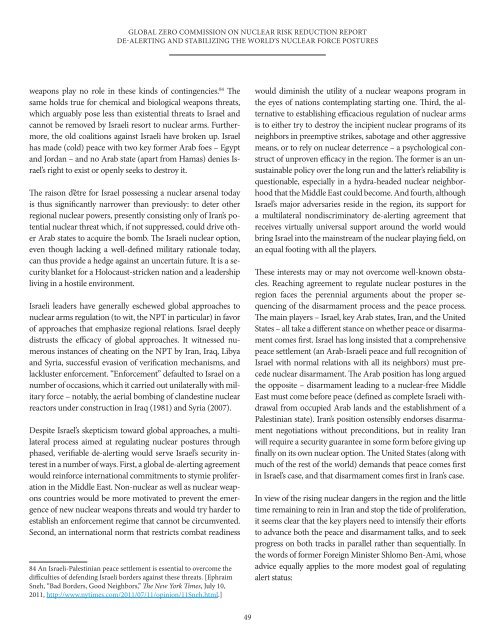global_zero_commission_on_nuclear_risk_reduction_report
global_zero_commission_on_nuclear_risk_reduction_report
global_zero_commission_on_nuclear_risk_reduction_report
You also want an ePaper? Increase the reach of your titles
YUMPU automatically turns print PDFs into web optimized ePapers that Google loves.
GLOBAL ZERO COMMISSION ON NUCLEAR RISK REDUCTION REPORTDE-ALERTING AND STABILIZING THE WORLD’S NUCLEAR FORCE POSTURESweap<strong>on</strong>s play no role in these kinds of c<strong>on</strong>tingencies. 84 Thesame holds true for chemical and biological weap<strong>on</strong>s threats,which arguably pose less than existential threats to Israel andcannot be removed by Israeli resort to <strong>nuclear</strong> arms. Furthermore,the old coaliti<strong>on</strong>s against Israeli have broken up. Israelhas made (cold) peace with two key former Arab foes – Egyptand Jordan – and no Arab state (apart from Hamas) denies Israel’sright to exist or openly seeks to destroy it.The rais<strong>on</strong> d’être for Israel possessing a <strong>nuclear</strong> arsenal todayis thus significantly narrower than previously: to deter otherregi<strong>on</strong>al <strong>nuclear</strong> powers, presently c<strong>on</strong>sisting <strong>on</strong>ly of Iran’s potential<strong>nuclear</strong> threat which, if not suppressed, could drive otherArab states to acquire the bomb. The Israeli <strong>nuclear</strong> opti<strong>on</strong>,even though lacking a well-defined military rati<strong>on</strong>ale today,can thus provide a hedge against an uncertain future. It is a securityblanket for a Holocaust-stricken nati<strong>on</strong> and a leadershipliving in a hostile envir<strong>on</strong>ment.Israeli leaders have generally eschewed <str<strong>on</strong>g>global</str<strong>on</strong>g> approaches t<strong>on</strong>uclear arms regulati<strong>on</strong> (to wit, the NPT in particular) in favorof approaches that emphasize regi<strong>on</strong>al relati<strong>on</strong>s. Israel deeplydistrusts the efficacy of <str<strong>on</strong>g>global</str<strong>on</strong>g> approaches. It witnessed numerousinstances of cheating <strong>on</strong> the NPT by Iran, Iraq, Libyaand Syria, successful evasi<strong>on</strong> of verificati<strong>on</strong> mechanisms, andlackluster enforcement. “Enforcement” defaulted to Israel <strong>on</strong> anumber of occasi<strong>on</strong>s, which it carried out unilaterally with militaryforce – notably, the aerial bombing of clandestine <strong>nuclear</strong>reactors under c<strong>on</strong>structi<strong>on</strong> in Iraq (1981) and Syria (2007).Despite Israel’s skepticism toward <str<strong>on</strong>g>global</str<strong>on</strong>g> approaches, a multilateralprocess aimed at regulating <strong>nuclear</strong> postures throughphased, verifiable de-alerting would serve Israel’s security interestin a number of ways. First, a <str<strong>on</strong>g>global</str<strong>on</strong>g> de-alerting agreementwould reinforce internati<strong>on</strong>al commitments to stymie proliferati<strong>on</strong>in the Middle East. N<strong>on</strong>-<strong>nuclear</strong> as well as <strong>nuclear</strong> weap<strong>on</strong>scountries would be more motivated to prevent the emergenceof new <strong>nuclear</strong> weap<strong>on</strong>s threats and would try harder toestablish an enforcement regime that cannot be circumvented.Sec<strong>on</strong>d, an internati<strong>on</strong>al norm that restricts combat readiness84 An Israeli-Palestinian peace settlement is essential to overcome thedifficulties of defending Israeli borders against these threats. [EphraimSneh, “Bad Borders, Good Neighbors,” The New York Times, July 10,2011, http://www.nytimes.com/2011/07/11/opini<strong>on</strong>/11Sneh.html.]would diminish the utility of a <strong>nuclear</strong> weap<strong>on</strong>s program inthe eyes of nati<strong>on</strong>s c<strong>on</strong>templating starting <strong>on</strong>e. Third, the alternativeto establishing efficacious regulati<strong>on</strong> of <strong>nuclear</strong> armsis to either try to destroy the incipient <strong>nuclear</strong> programs of itsneighbors in preemptive strikes, sabotage and other aggressivemeans, or to rely <strong>on</strong> <strong>nuclear</strong> deterrence – a psychological c<strong>on</strong>structof unproven efficacy in the regi<strong>on</strong>. The former is an unsustainablepolicy over the l<strong>on</strong>g run and the latter’s reliability isquesti<strong>on</strong>able, especially in a hydra-headed <strong>nuclear</strong> neighborhoodthat the Middle East could become. And fourth, althoughIsrael’s major adversaries reside in the regi<strong>on</strong>, its support fora multilateral n<strong>on</strong>discriminatory de-alerting agreement thatreceives virtually universal support around the world wouldbring Israel into the mainstream of the <strong>nuclear</strong> playing field, <strong>on</strong>an equal footing with all the players.These interests may or may not overcome well-known obstacles.Reaching agreement to regulate <strong>nuclear</strong> postures in theregi<strong>on</strong> faces the perennial arguments about the proper sequencingof the disarmament process and the peace process.The main players – Israel, key Arab states, Iran, and the UnitedStates – all take a different stance <strong>on</strong> whether peace or disarmamentcomes first. Israel has l<strong>on</strong>g insisted that a comprehensivepeace settlement (an Arab-Israeli peace and full recogniti<strong>on</strong> ofIsrael with normal relati<strong>on</strong>s with all its neighbors) must precede<strong>nuclear</strong> disarmament. The Arab positi<strong>on</strong> has l<strong>on</strong>g arguedthe opposite – disarmament leading to a <strong>nuclear</strong>-free MiddleEast must come before peace (defined as complete Israeli withdrawalfrom occupied Arab lands and the establishment of aPalestinian state). Iran’s positi<strong>on</strong> ostensibly endorses disarmamentnegotiati<strong>on</strong>s without prec<strong>on</strong>diti<strong>on</strong>s, but in reality Iranwill require a security guarantee in some form before giving upfinally <strong>on</strong> its own <strong>nuclear</strong> opti<strong>on</strong>. The United States (al<strong>on</strong>g withmuch of the rest of the world) demands that peace comes firstin Israel’s case, and that disarmament comes first in Iran’s case.In view of the rising <strong>nuclear</strong> dangers in the regi<strong>on</strong> and the littletime remaining to rein in Iran and stop the tide of proliferati<strong>on</strong>,it seems clear that the key players need to intensify their effortsto advance both the peace and disarmament talks, and to seekprogress <strong>on</strong> both tracks in parallel rather than sequentially. Inthe words of former Foreign Minister Shlomo Ben-Ami, whoseadvice equally applies to the more modest goal of regulatingalert status:49


